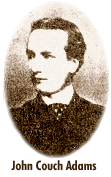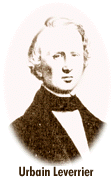A Discovery and a Scandal
 Explaining
Uranus turned out to be a tricky problem of orbital mechanics. Start with
the errors in Uranus's predicted motion. Subtract the effects of Saturn
and Jupiter. Now examine the remaining, slight irregularities in Uranus's
motion. That's all you have left to determine exactly which direction the
disturbance is coming from, how distant it is, and how massive it is. And
since it's a planet, you have to find a moving target. Hardly an easy problem.
Some mathematicians thought it impossible, and no one would tackle it.
Explaining
Uranus turned out to be a tricky problem of orbital mechanics. Start with
the errors in Uranus's predicted motion. Subtract the effects of Saturn
and Jupiter. Now examine the remaining, slight irregularities in Uranus's
motion. That's all you have left to determine exactly which direction the
disturbance is coming from, how distant it is, and how massive it is. And
since it's a planet, you have to find a moving target. Hardly an easy problem.
Some mathematicians thought it impossible, and no one would tackle it.
Fortunately for our story, two mathematicians did manage to solve it, quite independently of each other, and without knowing the other was working on the problem. John Couch Adams began working on the problem after he graduated from Cambridge in 1843.
 As
a starting point for the solution, Adams assumed the planet was at a distance
of 38.4 astronomical units, twice that of Uranus. It was also close to
the distance calculated by Bode's Law, a curious mathematical sequence
that seemed to match -- and potentially predict -- the distances of the
planets from the Sun.
As
a starting point for the solution, Adams assumed the planet was at a distance
of 38.4 astronomical units, twice that of Uranus. It was also close to
the distance calculated by Bode's Law, a curious mathematical sequence
that seemed to match -- and potentially predict -- the distances of the
planets from the Sun.
However, the solution Adams devised went unheeded by the Astronomer Royal at the Greenwich Observatory, George Airy, who believed the problem was mathematically unsolvable. Adams refined and resubmitted his prediction, but to no avail.
On the continent, Urbain Leverrier began working on the same problem in June of 1845 and presented his prediction to the Paris Academy of Sciences a year later. Realizing his colleagues had no intention of actually looking for this planet, Leverrier sent his information to Airy at the Greenwich Observatory. Upon comparing the predictions of Adams and Leverrier, Airy decided that Adams's work must have merit, but he never mentioned this to Adams, nor did he inform Leverrier about Adams's predictions, or even about the existence of John Adams, who had beat Leverrier to the solution by eight months.
 Though
a search was finally begun in July, 1846 at the Cambridge Observatory,
the astronomer in charge decided to ignore the predicted location of the
planet and conducted a sweeping, rather than a pinpoint, search. Mathematics,
after all, was no way to find a planet.
Though
a search was finally begun in July, 1846 at the Cambridge Observatory,
the astronomer in charge decided to ignore the predicted location of the
planet and conducted a sweeping, rather than a pinpoint, search. Mathematics,
after all, was no way to find a planet.
In August, 1846, Leverrier presented another paper in which he gave all the details of the planet -- the orbital elements, mass, and position. He was lauded for his mathematical skills, but no one offered to look for his planet. Frustrated, Leverrier finally sent his predictions to Johann Galle, an assistant at the Berlin Observatory.
On September 23, 1846, Galle received Leverrier's letter. That night he and a graduate student, Heinrich d'Arrest, aimed their telescope at the predicted location. Within an hour they found the planet. In a triumph of mathematical theory, Neptune had been discovered.
This was rather a scandal for the British, who had been in possession of the necessary information for the discovery, but had failed to act. Leverrier was credited with the discovery, since it was his data the Germans used to find Neptune. When the British tried to stake their claim in this momentous discovery, the Paris Academy of Sciences was in an uproar. Accusations were hurled across the Channel and public denouncements became ugly. Eventually the dispute settled down and, as his contribution became clear, Adams received his due credit. He now takes his place in history beside Leverrier as the first person to predict Neptune's location.
Still One Little Problem
 The presence
of Neptune now accounted for those errors in the orbit of Uranus -- almost.
When all known factors -- including Neptune -- were taken into account,
Uranus's motion still had very minor discrepancies from what was predicted.
The presence
of Neptune now accounted for those errors in the orbit of Uranus -- almost.
When all known factors -- including Neptune -- were taken into account,
Uranus's motion still had very minor discrepancies from what was predicted.
This time no one questioned Newton's Law, which had held up rather well over the years. Instead, astronomers proposed another planet as the culprit. Unfortunately, it would be too distant, too dim, and just too difficult to find. The nights at the telescope were long and cold enough already without engaging in a fruitless search, so most astronomers just never tried to find the ninth planet.